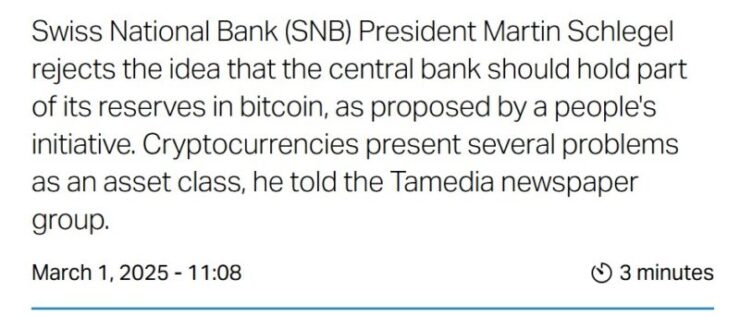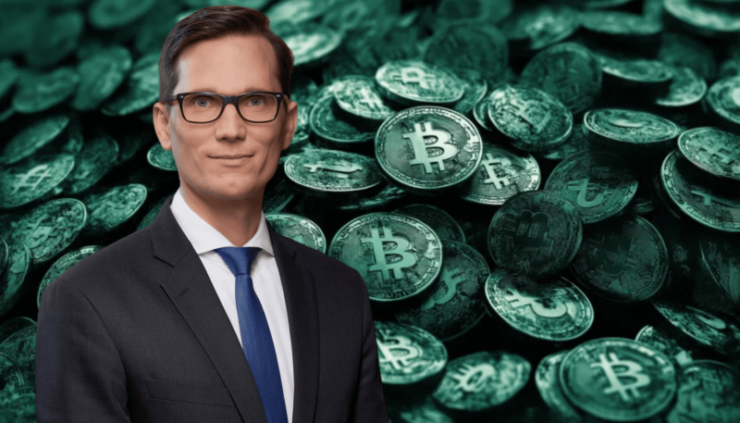Bitcoin has no place in Switzerland’s central bank reserves, according to SNB President Martin Schlegel, who cites volatility, liquidity, and security risks. His comments, made in an interview with Swiss media group Tamedia, come amid a growing national debate over Bitcoin’s role in the country’s financial ecosystem.

Schlegel outlined three reasons why Bitcoin fails as a reserve asset:
- Excessive Volatility – Schlegel argued that Bitcoin’s price swings make it unreliable as a long-term store of value, a key requirement for any central bank asset.
- Lack of Liquidity – Unlike traditional reserves such as gold or foreign currencies, which can be quickly accessed for monetary policy needs, Bitcoin’s liquidity remains insufficient for central banking purposes.
- Security Risks – Schlegel raised concerns about the software-based nature of digital assets, warning that bugs, vulnerabilities, and cyber threats pose risks that make Bitcoin an unsuitable reserve asset.
Switzerland’s Growing Debate Over Bitcoin Reserves
A new Swiss initiative is calling for a constitutional amendment that would require the Swiss National Bank (SNB) to add Bitcoin to its national reserves alongside gold. The movement, spearheaded by Swiss entrepreneur Yves Bennaim, has sparked fresh debate over the role of digital assets in national financial stability.
Launched in December 2024, the initiative does not specify the exact percentage of Bitcoin allocation but emphasizes that the accumulation should come from the central bank’s earnings rather than new purchases or forced acquisitions. To trigger a nationwide referendum, the proposal needs to collect 100,000 signatures within 18 months.
This movement comes as Switzerland increasingly integrates cryptocurrency into its financial ecosystem. Several Swiss banks already offer crypto-related services, and the country is home to Zug’s “Crypto Valley,” a major blockchain innovation hub. However, despite this progress, the SNB remains skeptical about Bitcoin’s long-term viability as a reserve asset.
Global Perspectives
While the Swiss National Bank remains opposed to Bitcoin, other nations have taken different approaches to integrating cryptocurrency into their financial strategies. El Salvador stands out as the first country in the world to adopt Bitcoin as legal tender, actively accumulating BTC in its national reserves as part of its long-term economic policy. The country’s pro-crypto stance has drawn global attention, with its government continuing to increase its Bitcoin holdings despite market fluctuations.
In the United States, Bitcoin has yet to be federally recognized as a reserve asset, but discussions about its potential inclusion have surfaced at state-level legislatures. Several states have proposed adding BTC to their treasuries, reflecting a growing interest in digital assets as part of public financial management. However, federal regulators remain divided on the issue, with no clear indication of an imminent policy shift.
Meanwhile, Germany and Poland have explicitly rejected the idea of Bitcoin as a reserve currency, citing concerns over price volatility and security risks. Both nations have maintained a conservative monetary stance, emphasizing the need for stability in their central banking policies. While their regulators acknowledge Bitcoin’s growing role in global finance, they have made it clear that it does not align with their current reserve asset strategies.
Quick Facts:
- Swiss National Bank’s President Martin Schlegel rejected Bitcoin as a reserve asset, citing volatility, lack of liquidity, and security risks.
- A Swiss citizens’ movement is advocating for a vote on adding Bitcoin to the SNB’s reserves, requiring 100,000 signatures for consideration.
- While most central banks reject Bitcoin, El Salvador has embraced it, while countries like Poland and the U.S. remain cautious.





